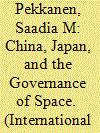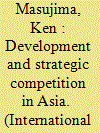|
|
|
Sort Order |
|
|
|
Items / Page
|
|
|
|
|
|
|
| Srl | Item |
| 1 |
ID:
189484


|
|
|
|
|
| Summary/Abstract |
China and Japan are among the world’s top space powers, with significant technical competence in both conventional and ‘newspace’ capabilities. Since the early 1990s, each country has also taken a keen interest in shaping the governance of outer space activities. But they have done so in remarkably different ways, calling into question Asian states’ supposed preferences for soft and informal institutions. Japan has led the Asia-Pacific Regional Space Agency Forum, involving both state and nonstate participants, which is guided by a set of principles. China has opted for a high-profile formal intergovernmental design, the Asia-Pacific Space Cooperation Organization, with a Convention and all the trappings of a formal organizational structure. This article assesses the activities of China and Japan in the new space race, discusses how and why the design of their space governance differs, and reflects on prospects for competition and cooperation.
|
|
|
|
|
|
|
|
|
|
|
|
|
|
|
|
| 2 |
ID:
189486


|
|
|
|
|
| Summary/Abstract |
The prioritization of economic development, considered as a key in understanding the co-existence of heightened security situations and growing economic interdependence in Asia, should be considered as a political strategy among many chosen by political elites in their own political context rather than a consensus implying general acquiescence to the idea. The recent competition between the Belt and Road Initiative by China and the Free and Open Indo-Pacific by the United States, Japan, Australia, and India confirms and reinforces the tendency toward the mobilization of development policy for increasingly strategic purposes in the context of rising tension between the United States and China. At the same time, there is some cooperative element in prioritizing development in Asia.
|
|
|
|
|
|
|
|
|
|
|
|
|
|
|
|
| 3 |
ID:
189482


|
|
|
|
|
| Summary/Abstract |
In the wake of the Asian Financial Crisis, East Asia’s efforts to enhance regional financial cooperation raised the possibility of East Asia playing a more assertive role in global financial governance. However, despite the region’s increased voice in governance and economic weight, East Asian financial systems and markets have mostly adapted to global norms developed in New York, London, and Washington, DC. We argue that the failure of East Asia to push an alternative vision of financial governance reflects both the lack of regional political unity and, more crucially, the divisions of interests both between and within key East Asian economies. Despite nearly universal regional dissatisfaction with global standards and institutions in the wake of the Asian Financial Crisis, these two factors have combined to prevent the development of a distinctive regional model that could be promoted at the global level.
|
|
|
|
|
|
|
|
|
|
|
|
|
|
|
|
| 4 |
ID:
189485


|
|
|
|
|
| Summary/Abstract |
This article provides a holistic analysis of the ‘migration regime complex’ in Asia, which is distinguished from other regions of the world in the absence of a refugee protection regime. The ‘refugee regime complexity’ argument (Betts) fails to take into consideration the deviant behaviors of Asian states that have been excluded from the core institution building. The immigration control policies of Asian countries reflect their respective strategies that seek to take advantage of the economic opportunities provided by the international environment within the domestic sociopolitical constraints. The case studies show that Asian states while rejecting the UN-led refugee regime, tolerate irregular migration not only to protect their vital interest in economic development but also to maintain political stability at both national and regional levels.
|
|
|
|
|
|
|
|
|
|
|
|
|
|
|
|
| 5 |
ID:
189481


|
|
|
| 6 |
ID:
189487


|
|
|
|
|
| Summary/Abstract |
Asia-Pacific lacks an environmental leader. Japan, a forerunner of environmental regulation in the 1970s, started to engage in active environmental diplomacy in the post-Cold War era by hosting conferences of parties to multilateral environmental agreements such as the Convention on International Trade in Endangered Species of Wild Fauna and Flora (CITES) and the United Nations Framework Convention on Climate Change (UNFCCC) as well as providing a massive amount of environmental aid. Then, in the 2000s, Japan’s initiatives became substantially weakened and have gained a negative international reputation as the country took a considerably passive position to the Paris Agreement, filed many reservations to the CITES listing decisions, and withdrew from the International Whaling Commission. This article explores, through six brief case studies, the factors and structures that systemically impede Japan’s environmental leadership and norm internalization. It highlights the constraining factors behind Japan’s devolution including its closed bureaucratic system and the lack of positive engagement of Japanese scientists. Finally, it addresses the future prospects of environmental cooperation in the Asia-Pacific.
|
|
|
|
|
|
|
|
|
|
|
|
|
|
|
|
|
|
|
|
|